
Young Minds
02 Aug 2017
Calling all astronomers and space scientists!
Calling all astronomers and space scientists! Can you take your most recent publications and explain it to kids or teens in under 2000 words?

Young Minds
02 Aug 2017
Calling all astronomers and space scientists! Can you take your most recent publications and explain it to kids or teens in under 2000 words?

Young Minds
10 Jul 2017
Frontiers for Young Minds announces the first Collection on Tropical Biodiversity and why we should care? Hosted by editors Ana Maria Almeida & Chelsea Specht
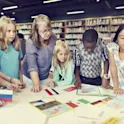
Young Minds
05 Jul 2017
Frontiers for Young Minds content of articles – both text and images – are free to access, download, and reproduce in educational materials.
Young Minds
16 Jun 2017
To highlight why each discovery is important with background and context, these collections of articles take non-technical readers through the core of a field. Frontiers for Young Minds is excited to share its latest effort to bring high-quality science content to interested young readers everywhere. Our authors have already highlighted some of the latest scientific developments – from alternative fuels to adolescent risk-taking – and we want to take the next step. We want researchers to help us dive deeper into the central ideas and tools in each field, but in the same kid-friendly format as before. That is why we have launched our Collections: groups of articles covering a central theme from a variety of perspectives and methods. While the Young Minds New Discovery articles have provided snapshots of the cutting-edge, we want our Core Concept articles to provide the background and context to help young readers understand why each discovery is so important. Each Collection will serve as an in-depth guide, taking readers through the core of a field: one Collection introducing each region of the brain or exploring Earth’s systems from the cryosphere to the atmosphere. Each article in the Collection […]

Young Minds
07 Jun 2017
Frontiers for Young Minds takes this one step further, by asking authors to explain their published articles in a language that 8-15 year olds can understand. This is put to the test as kids act as the reviewers. Michelle Juarez, professor at City College of New York, uses Drosophila fruit flies to study questions about wound repair and infection. Early on in her career, she embraced teaching younger students. “During my research training in fruit fly development I learned the joys of teaching younger students. Now in my current job as a Professor, I strive to combine my research and teaching into one environment and help inspire the next generation to use science in their careers.”, she explains. Michelle decided to re-write her article investigating the genes that regulate wound healing processes in skin cells in a way that would be understood by a young audience. The result was then put to the test by the Young Reviewers from the Metropolitan School of Panama. Kids can be the toughest critics, with most admitting they got lost early on. What holds the interest of a scientist might not be the best way to engage a younger audience. The kids were intrigued […]
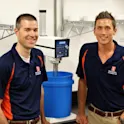
Young Minds
23 May 2017
The research, published in Frontiers for Young Minds, focuses on early-life nutrition and how that influences brain development, using pigs as a human proxy.
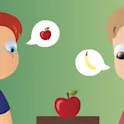
Young Minds
16 May 2017
That’s 100 articles of cutting-edge science available – for free – for kids, teens, parents, teachers, and the young-at-heart.

Young Minds
05 May 2017
Frontiers for Young Minds is excited to announce its new partnership with The GLOBE Program!
Young Minds
11 Apr 2017
Frontiers for Young Minds is expanding and we are pleased to announce the launch of its newest specialty section, Understanding Mathematics.

Young Minds
08 Mar 2017
Understanding the Earth and its Resources aims to provide up-to-date research to the next generation who will live with, and study, these planet-wide questions.
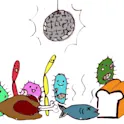
Young Minds
13 Jan 2017
Frontiers in Microbiology specialty sections are turned into fun illustrations. Enjoy, download and color them! — by Chloe Schmidt Frontiers in Microbiology Art Gallery Frontiers in Microbiology is the largest and second most-cited open-access journal in the category of Microbiology, based on our analysis of the 2015 Journal Citation Report (Thomson Reuters, 2016). Along with our other journal in the field, Frontiers in Cellular and Infection Microbiology, Frontiers in Microbiology is comprised of 16 specialty sections that seek to cover all areas of microbiology. We depicted the microbiology specialty sections in the artistic interpretations in the gallery below — and make these available for download as a coloring book, please see below. The building blocks of our sections are article collections called Research Topics. Research Topics delve into more specialized subjects and are proposed, organized and hosted by Guest Associate Editors. If there is a particular area of research that you feel warrants deeper exploration, don’t hesitate to get in touch with us about creating a proposal at: microbiology@frontiersin.org Coloring Book download and instructions: Print one for your kids, your stressed colleagues, or yourself. We want to see your creations! Tweet them at @FrontMicrobiol using the hashtag #ColorMeMicrobe P.S. Check out our journal […]
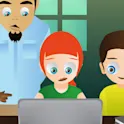
Young Minds
14 Dec 2016
In association with the Bay Area Science Festival, Frontiers for Young Minds hosted the second edition of our annual event, held at the Chabot Space and Science center in Oakland on the 29th of October and what a success it was! Researchers were asked to present their work not only to the public, but also to a panel of six young reviewers who had a variety of challenging questions for them. The event began with an introduction from our Chief Editor, Robert Knight and moderated by neuroscientist, Indre Viskontas who described how Frontiers for Young Minds ‘flips the scientific process’ by having kids review scientific publications and consequently, providing an excellent tool for scientists to become better communicators. The whole event can be viewed from each of the below shots, so why not see what our young reviewers had to say. Watch the video Prior to the event, the Young Reviewers were given the chance to read the submitted papers and prepare some questions that they could ask at the end of each presentation. One of our reviewers, Paceyn (age 7), highlighted a key question that authors had overlooked when presenting an article on the processes used to study evolution – “I really liked it and there was […]

Young Minds
16 Nov 2016
Frontiers for Young Minds provides a collection of freely available scientific articles by scientists that are shaped for younger audiences by their own young peers.

Young Minds
15 Nov 2016
Sometimes macrophages are given the wrong signals and they attack healthy cells. When this happens, your body develops a reaction that can lead to autoimmunity.

Young Minds
12 Oct 2016
Frontiers for Young Minds is excited to announce its second live review event which will take place at the Chabot Space and Science Center as part of the Bay Area Science Festival. The team will be coming together once again to welcome our scientists who will have the difficult task of presenting their work to our panel of Young Reviewers. This year, four papers will be presented to our panel of six curious young minds! The panel is made up of some of our most experienced Young Reviewers aged between 7 and 13. They will review the scientists’ presentations as well as their papers, and push the researchers to better explain their work and why it is important. Will our scientists succeed in translating their work and how will they react to the challenging questions they will face from our panel? For a quick preview, check out what happened in last year’s event here where our panel explained the criteria used when deciding whether a paper should be accepted or not. We hope to see you there! Event Details Where? Chabot Space & Science Center When? October 29th, 2.00-4.00 pm Tickets: $9 per adult & $7 per child To find out more about the event and to reserve your tickets, visit: Chabot […]
Get the latest research updates, subscribe to our newsletter